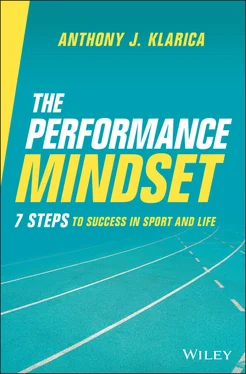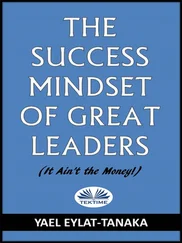Anthony J. Klarica - The Performance Mindset
Здесь есть возможность читать онлайн «Anthony J. Klarica - The Performance Mindset» — ознакомительный отрывок электронной книги совершенно бесплатно, а после прочтения отрывка купить полную версию. В некоторых случаях можно слушать аудио, скачать через торрент в формате fb2 и присутствует краткое содержание. Жанр: unrecognised, на английском языке. Описание произведения, (предисловие) а так же отзывы посетителей доступны на портале библиотеки ЛибКат.
- Название:The Performance Mindset
- Автор:
- Жанр:
- Год:неизвестен
- ISBN:нет данных
- Рейтинг книги:3 / 5. Голосов: 1
-
Избранное:Добавить в избранное
- Отзывы:
-
Ваша оценка:
- 60
- 1
- 2
- 3
- 4
- 5
The Performance Mindset: краткое содержание, описание и аннотация
Предлагаем к чтению аннотацию, описание, краткое содержание или предисловие (зависит от того, что написал сам автор книги «The Performance Mindset»). Если вы не нашли необходимую информацию о книге — напишите в комментариях, мы постараемся отыскать её.
The Performance Mindset: 7 steps to success in sport and life
The Performance Mindset: 7 steps to success in sport and life
The Performance Mindset — читать онлайн ознакомительный отрывок
Ниже представлен текст книги, разбитый по страницам. Система сохранения места последней прочитанной страницы, позволяет с удобством читать онлайн бесплатно книгу «The Performance Mindset», без необходимости каждый раз заново искать на чём Вы остановились. Поставьте закладку, и сможете в любой момент перейти на страницу, на которой закончили чтение.
Интервал:
Закладка:
Is talent overrated?
One interesting insight that arises from Sam's experience is how difficult it is to identify talent or how perceived talent, even at 18, may or may not be realised. Considering the resources, including the experience and expertise of recruiting teams in many sports, identifying future performers remains a challenge. Recruiters and talent scouts need to consider how a future athlete will approach their career once they are drafted as much as or even more than what they have already delivered. Attitude and mindset will determine whether any talent is fully realised and whether they are able to continue to develop.
If we investigate one angle reflecting the challenges, let's look more closely at the Brownlow Medal. Taking into account 19 Brownlows between 1996 and 2021, the average draft selection for the winner was pick 26. (To determine this average, I excluded father/son and zone draft selections as these factors influence where they were selected. Prior to 1996 the draft was not as relevant as today, and players were recruited through zones and other avenues.)
I know some will regard pick 26 as a reasonably high selection. Many diverse factors can also contribute to a prospective winner's chances, such as injury or availability to play, or the team they were selected to and teammates who might draw votes away. It is evident, however, that some of the highest awarded players in the history of the AFL were not recognised at that level at the time of being drafted. Athletes such as Sam Mitchell made themselves into the players they became — through mindset.
That mindset contributed to Sam's left foot–right foot regime, which was one reflection of his determination to achieve his goal of becoming an AFL player. It is even arguable that considering the players who have won the Brownlow as a top 10 draft selection, the feat was achieved on the back of mindset, which enabled them to capitalise on their talent after they were drafted, rather than depending on talent alone. The average number of years that this group had been playing when they won the award is just over seven. This indicates that the length of time to learn and grow is likely a better predictor of a Brownlow winner than draft selection.
Ash, Storm, Sam and the other athletes featured in this book drew on a wide and varied talent base. Even for talented athletes, the path is not straightforward. A forward trajectory is governed by mindset, which in turn contributes to a capacity to learn and grow, as well as do the work required.
Interesting reading on the topic of talent includes The Talent Code by Daniel Coyle, The Sports Gene by David Epstein and Talent Is Overrated by Geoff Colvin.
Assessing mindset variables
An oft‐cited story, due to his stellar career in the American National Football League (NFL), is that of Tom Brady. Brady was drafted at pick 199 in 2000. At the time of writing, he had won more championships as a player than some NFL clubs have won in their entire history. What is less well known about his story is the investment he made as a junior in a football coach with a wealth of experience, Tom Martinez. In his book The Talent Code , Daniel Coyle describes how Brady carries in his wallet a list of technique tips learned from the veteran coach and that he has an ongoing relationship with his long‐time mentor. 1In the Brady 6 documentary, former NFL head coach Steve Mariucci comments on Brady being overlooked by clubs and his low draft pick: ‘We didn't open up his chest and look at his heart … and resiliency, and all the things that are making him great now.’ 2
While not identified at his draft as the player he would become, Brady had already invested in a range of ways other than his physical development while a junior that paid him back. Recognising this, Ian O'Connor, reporting for ESPN.comin 2016, wrote an article headlined: ‘Tom Brady's greatest talent is his desire to be great.’ 3It's clear that more than talent contributed to his accomplishments.
I have had an insider's view of the AFL draft process, as well as selections of athletes in other sports. Over some 20 years I have been contracted by different AFL clubs and sports to participate in the interview process that supports coaches and recruiters in the selection of athletes. Over that time I have seen the emphasis on personal attributes and qualities grow significantly. Areas that recruiters now consider more than they used to include (in no particular order):
capacity to learn and grow
determination and drive
independence
capacity as a team member
competitive spirit
cultural fit
general game‐day mental skills
resilience
wellbeing
decision making on and off the field
training attitude and commitment
coachability.
The growth in consideration of psychological variables in athlete selection processes reflects the increased recognition of the importance of mindset. This consideration also helps support the wellbeing and development of players once selected. In sports, there is more awareness of the support a player may need before they begin. In the recruiting process, references from junior coaches and key support staff are checked. Of course, physical data and testing, injury history, specific sporting IQ, how they play the game and vital information on sport performance history are important and meticulously scrutinised. However, a multitude of other factors have been increasingly recognised as important when assessing whether a player will be able to utilise, and grow from, any talent shown.
One challenge in the selection process of any athlete in any sport is that while physical prowess can easily be tested and compared (it's simple to test how fast an athlete can run or how high they can jump), psychological variables are much harder to determine and rank. They are not as visible, they vary significantly and they are impacted by many factors, which makes mindset much more difficult to identify, compare and project. That many athletes are selected while still developing physically and emotionally adds further complexity. A person at 16 or 18 is often very different from the person they become in their late twenties.
Through the process of considering mindset variables, it is apparent that observed talent is only one variable in future performance. That's why Sam Mitchell and Tom Brady slipped through the top order of the draft net, only for time to reveal their true ability. If they had not been selected at those late picks, their sporting talent might not have been realised. I wonder what they would be doing now if they had been overlooked in their respective drafts.
On this topic, Alex Hutchinson, author of Endure: mind, body and the curiously elastic limits of human performance, 4observes that ‘even relying on the best science available, you're inevitably going to pick duds — and perhaps more significantly, miss some athletes with potential to develop into world beaters'. 5
Research insights
A 2004 study examined ‘primary’ and ‘secondary’ influences on sport expertise:
Primary influences include genetics, training and psychological factors.
Secondary influences include socio‐cultural and contextual elements. 6
Research insights
Research suggests that coaches and sport psychology staff working with younger athletes should consider targeting specific mindset skill development including personal wellbeing and self‐reliance to enhance sport development in juniors. Skills required to assist young athletes transition from youth squads to elite performers in rugby include:
enjoyment
responsibility
Читать дальшеИнтервал:
Закладка:
Похожие книги на «The Performance Mindset»
Представляем Вашему вниманию похожие книги на «The Performance Mindset» списком для выбора. Мы отобрали схожую по названию и смыслу литературу в надежде предоставить читателям больше вариантов отыскать новые, интересные, ещё непрочитанные произведения.
Обсуждение, отзывы о книге «The Performance Mindset» и просто собственные мнения читателей. Оставьте ваши комментарии, напишите, что Вы думаете о произведении, его смысле или главных героях. Укажите что конкретно понравилось, а что нет, и почему Вы так считаете.










